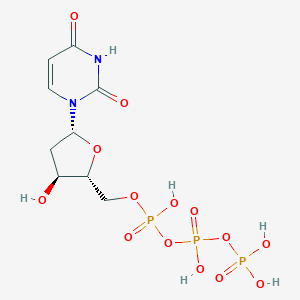Details of Metabolite
| Full List of Protein(s) Regulating This Metabolite | ||||||
|---|---|---|---|---|---|---|
| GPCR secretin (GPCR-2) | ||||||
| Glucagon receptor (GCGR) | Click to Show/Hide the Full List of Regulating Pair(s): 1 Pair(s) | |||||
| Detailed Information |
Protein Info
 click to show the details of this protein click to show the details of this protein
|
|||||
| Regulating Pair |
Experim Info
 click to show the details of experiment for validating this pair click to show the details of experiment for validating this pair
|
[1] | ||||
| Introduced Variation | Knockout of Gcgr | |||||
| Induced Change | dUTP concentration: decrease (FC = 1.3) | |||||
| Summary | Introduced Variation
|
|||||
| Disease Status | Type 2 diabetes mellitus [ICD-11: 5A11] | |||||
| Details | It is reported that knockout of GCGR leads to the decrease of dUTP levels compared with control group. | |||||
| Mitochondrial carrier (MC) | ||||||
| Solute carrier family 25 member 33 (SLC25A33) | Click to Show/Hide the Full List of Regulating Pair(s): 1 Pair(s) | |||||
| Detailed Information |
Protein Info
 click to show the details of this protein click to show the details of this protein
|
|||||
| Regulating Pair |
Experim Info
 click to show the details of experiment for validating this pair click to show the details of experiment for validating this pair
|
[2] | ||||
| Introduced Variation | Recombinant protein addition of SLC25A33 | |||||
| Induced Change | dUTP concentration: increase | |||||
| Summary | Introduced Variation
|
|||||
| Disease Status | Healthy individual | |||||
| Details | It is reported that recombinant protein addition of SLC25A33 leads to the increase of dUTP levels compared with control group. | |||||
| Solute carrier family 25 member 36 (SLC25A36) | Click to Show/Hide the Full List of Regulating Pair(s): 1 Pair(s) | |||||
| Detailed Information |
Protein Info
 click to show the details of this protein click to show the details of this protein
|
|||||
| Regulating Pair |
Experim Info
 click to show the details of experiment for validating this pair click to show the details of experiment for validating this pair
|
[2] | ||||
| Introduced Variation | Recombinant protein addition of SLC25A36 | |||||
| Induced Change | dUTP concentration: increase | |||||
| Summary | Introduced Variation
|
|||||
| Disease Status | Healthy individual | |||||
| Details | It is reported that recombinant protein addition of SLC25A36 leads to the increase of dUTP levels compared with control group. | |||||
If you find any error in data or bug in web service, please kindly report it to Dr. Zhang and Dr. Mou.

